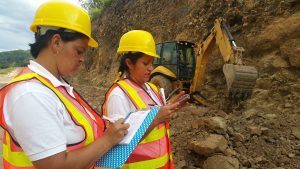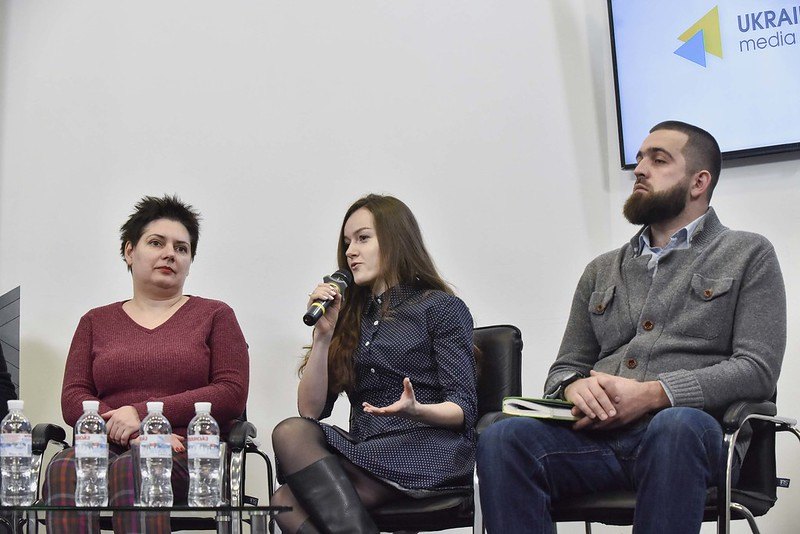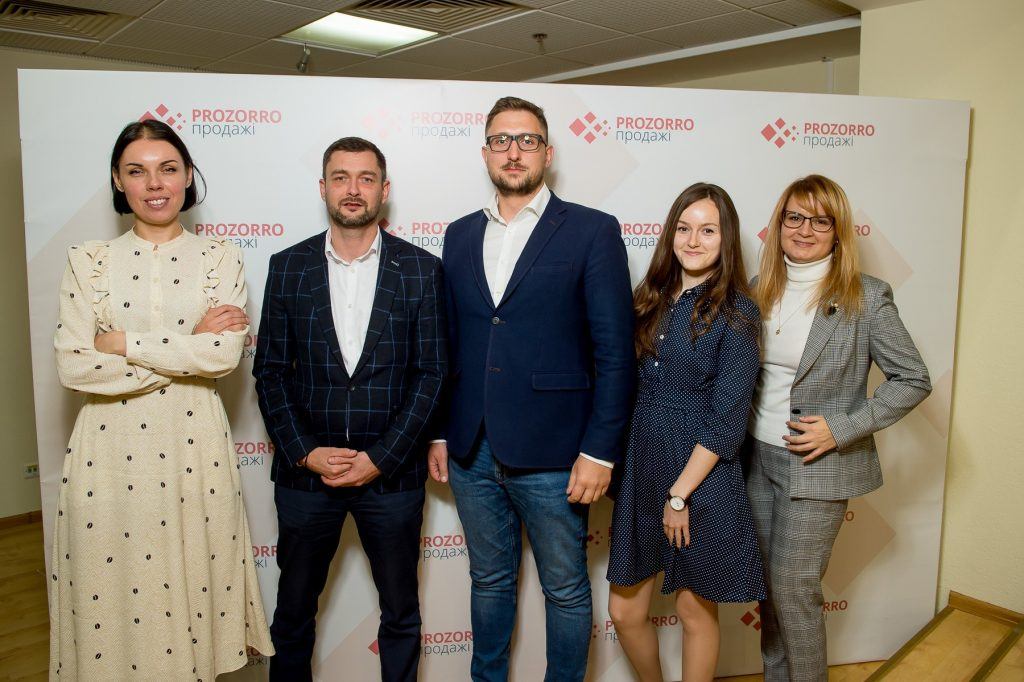Faces of Open Government: Oleksii Sobolev and Khrystyna Zelinska
Rostros del gobierno abierto: Oleksii Sobolev y Khrystyna Zelinska
This blog is part of our work through the EU for Integrity Programme for the Eastern Partnership, a multi-year collaboration with the European Union to strengthen the support and resources available to country reformers in the region to deepen reforms and advance bold, new ideas in areas like strengthening public service deliveryTo ensure that citizens of all groups are better supported by the government, OGP participating governments are working to improve the quality of and access to public services. Commitments in this are... More, opening civic space, promoting a fair justiceTo address barriers that prevent citizens from having their justice needs met, OGP participating governments are working to expand transparency, accountability, and inclusion into all systems of justi... system and fighting corruption.
Oleksii Sobolev is the Chief Executive Officer of Prozorro.Sale and Khrystyna Zelinska is the Innovation Projects Program Manager for Transparency International Ukraine. In this interview, they share reflections about Ukraine’s Prozorro.Sale, an innovative e-trade system created in the aftermath of the Revolution on Dignity that allows the government to sell or lease state and municipal property in a fully transparent and open way.
OGP: Prozorro.Sale has been dubbed as an “EBay for Government”. Can you explain how the system works and how it has changed the practice of selling public assets in Ukraine?
Oleksii Sobolev (Prozorro.Sale): The initial purpose of Prozorro.Sale was to create a transparent system for selling the assets of insolvent banks. Over time, the scope of activities has expanded to other assets – property of state-owned enterprises, lease rights, advertising rights, and more. Now, Prozorro.Sale has different types of auctions for streams such as land leasing, timber, concession, insolvency, small privatization, property lease, state reserve, green energyEnsuring universal access to sustainable, dependable, and affordable energy is critical to every aspect of prosperity. Increasing public oversight and transparency in the energy sector can help to ens... More, etc.
Prozorro.Sale is based on two innovations:
- Two-tier structure: When selling assets, the Prozorro.Sale system acts exclusively as a central database. It accumulates all objects to be sold (first level) and organizers and bidders interact with the system exclusively through e-marketplaces that are connected to the system (second level). The e-marketplaces are responsible for quality advisory support to both buyers and sellers. Such a configuration allows it to adhere to the underlying principle of Prozorro.Sale, namely: “everyone sees everything”.
- Complete transparencyAccording to OGP’s Articles of Governance, transparency occurs when “government-held information (including on activities and decisions) is open, comprehensive, timely, freely available to the pub... More: After the auction all the data about the bidders and the signed contract is published in machine readable format and is easily accessible via API, business analytics modules or websites. This level of transparency has substantially increased trust in the auction results and allowed the state and local governments to carry out transactions.
OGP: Can you explain how the system has helped you advance your organization’s objectives?
Khrystyna Zelinska (Transparency International Ukraine): Preventing corruption and involving people in the fight against it through innovative solutions are strategic targets of TI Ukraine. The first important anti-corruption IT-solution of that kind was a government e-procurement system Prozorro, which we helped create.Then, in 2016 TI Ukraine joined the development process of another breakthrough system Prozorro.Sale that is currently the biggest platform for selling and leasing state assets. This system helped to open “hard-to-get” data, make all the processes online and show the way public officials made decisions for sales or leases of state and communal property. The key outcome is that these decisions are not so connected to the human component any more and depend on the results of an open and transparent e-auction where businesses compete for asset purchase.
Prozorro.Sale has become an efficient tool for businesses and the community to control and look after the market of state and communal property, and that is a solid step towards fighting possible manipulation in privatization and lease processes.
OGP: You have chaired the pioneering online auction system that helps to generate state revenue through open and fair bidding. Five years after the creation of Prozorro.Sale, what do you think are its biggest achievements and results?
Sobolev: What matters most is a shift from the pilot stage to formal institutionalization. Prozorro.Sale was born in 2016 from a partnership between various state institutions and Transparency International Ukraine, who initially administered the central database. Since 2018, the rights have been fully transferred to the State Enterprise Prozorro.Sale. This initiative, which started as a project exclusively backed by international donors with no state funding, has evolved into a self-financing enterprise adhering to the best corporate governance practices. Prozorro.Sale has successfully generated more than 39 bln hryvnia (1.4 billion USD) to various budgets over 31,000 auctions and reformed state property management (privatization and lease), insolvency, timber, natural resource licensing and management of the failed banks and other markets. More than 2,300 different state and local authorities are using the system.
Prozorro.Sale has become an efficient tool for businesses and the community to control and look after the market of state and communal property.
The main achievement is that complete transparency of the auctions has significantly increased trust in the government in areas it had been lacking, like privatization and banking. We also managed to assemble a stellar team of reformers that are able to reform sector after sector in a short time frame.
OGP: Prozorro.Sale was originally owned and created by TI Ukraine before your team transferred ownership to the government. What was cooperation with government stakeholders like when Prozorro.Sale was still owned by TI Ukraine? How has it shifted since?
The main achievement is that complete transparency of the auctions has significantly increased trust in the government in areas it had been lacking, like privatization and banking.
Zelinska: During the first two years the project was fully under the umbrella of TI Ukraine, and in 2018 it turned into the state-owned enterprise Prozorro.Sale. We continued to administer two databases of the system until summer 2019. All the way through we cooperated closely with the Ministry of Economy and Deposit Guarantee Fund. It was important not only to support and develop the system but also to control the procedures of asset sales. Therefore, two commissions affiliated with SOE Prozorro.Sale and Deposit Guarantee Fund were created to consider complaints of auction participants about injustice cases or violation of their rights.
After TI Ukraine transferred all the rights on databases of the e-sales system to Prozorro.Sale, we continued to cooperate with government institutions improving the system and transferring new markets into an e-auctions format. For example, in 2019, we advocated that sales of bankrupt companies’ assets and sales and leases of state and communal property should be held in the Prozorro.Sale system. It opened more data and reduced corruption risks in the processes that used to be closed.
Currently, our team has delivered the methodology for efficient monitoring of privatization and leasing processes. We are beginning to work on monitoring network creation to stimulate the sales of non-core assets and raise the state’s capacity to run these processes in a professional way without violations.
OGP: Many countries around the world, especially former Soviet neighbors of Ukraine, struggle with privatization processes often characterised with mismanagement, corruption and murky deals with politically connected oligarchs. What is your advice for OGP members and reformers who want to implement similar reforms?
Sobolev: Do not try to blindly borrow ideas and decisions made by other people in other countries in other settings. To implement Prozorro.Sale we had to overcome rather sceptical bias from our international partners and consultants because two-tier systems and centralization of public asset management is rather new and not practiced in other countries, but we felt that it was the right thing to do in Ukraine. On the other hand we did consult a lot and looked for international experience in certain areas. Our open data standard is based on the Open Contracting Data Standard, which helped us a lot to streamline the transparency. Always stay focused on the result, not the process. Quick victories are important but institutional change is a marathon, so stay focused and organize accordingly to sustain long-term battles.
Any successful reform starts from political will and a corresponding mandate. Be ready to catch up with the window of opportunity for reinforcing reform efforts, while retaining strategic planning and forward-looking thinking.
With regards to the e-auctions reform, the legal architecture and IT-logic create together a foundation for sustainable change. Creating a strong legal framework to ensure the smooth launch of such foundation IT systems is key.
Quick victories are important but institutional change is a marathon, so stay focused and organize accordingly to sustain long-term battles.
Consider a “one-stop shop” approach: in Prozorro.Sale, we have an in-house legal team, IT-team and project management team working together. This allows us to develop legislationCreating and passing legislation is one of the most effective ways of ensuring open government reforms have long-lasting effects on government practices. Technical specifications: Act of creating or r... and lobby it, while developing and executing the code. This also brings flexibility and swiftness of decisions.
The future is innovation. Digitalization is a great pretext for any kind of change, so use it and be completely transparent!
OGP: What were the key factors that enabled a civil society organization to cooperate with the government in such an effective way? What advice would you give to other civil society reformers who would like to replicate this reform?
Zelinska: I think this is about a clear commitmentOGP commitments are promises for reform co-created by governments and civil society and submitted as part of an action plan. Commitments typically include a description of the problem, concrete action... to a results and system approach. Our organization is interested in enduring anti-corruption changes. That’s why we continue to deepen development of the state’s property management reform.
Our recommendation for reformers interested in implementing a similar reform is to be ready to play the long game. Ukrainian experience shows that the windows of opportunities never stay open for long. And reforms require not only political will, but also determination, insistence and mobilization of all the influential stakeholders.
Reforms require not only political will, but also determination, insistence and mobilization of all the influential stakeholders.
Rapid Fire Questions
OGP: What is the biggest motivator for you in your work?
Sobolev: Delivering impact and seeing the reform being successfully sustained and scaling up to new markets. Growth involves constant innovation and new challenges, so it never gets boring.
Zelinska: Awareness that my work impacts economic development of the country, promotes fair rules of the game, and can influence key reforms motivates me to do more.
OGP: What inspired you to get involved in open government?
Sobolev: This all happened because of the Revolution of Dignity. I was very active in the protests. Then after the revolution succeeded, I quit my job as a fund manager and went volunteering as an advisor to the Minister of Infrastructure. Back then the government sector was very obscure so openness and transparency were natural reform needs. I have pushed for more transparency ever since.
Zelinska: Because I believe and use every day the principle of openness and transparency – not only in the professional and civic activity parts of my life, but also in my personal life. The Maidan Revolution of 2013-2014 was one of the most inspired moments to understand this. Actually, after those events, I started to work with increasing the transparency and accountability in local and national governmental processes.
OGP: What is your advice to government reformers who are pushing ahead for changes against all odds?
Sobolev: Tackle big problems first, stick to complete transparency, don’t underestimate the power of the “golden triangle” (cooperation between government, civil society and the private sectorGovernments are working to open private sector practices as well — including through beneficial ownership transparency, open contracting, and regulating environmental standards. Technical specificat... More), build self-financing systems with strong pro-democracy culture, and remember that a high performing team with market-level salaries and a strong coordination could change billion dollar sectors.
OGP: What is your advice for civil society organizations that want to be more efficient in their work?
Zelinska: Don’t set yourselves up only for the oppositional fight, but try to cooperate with different stakeholders and find a compromise with the government. But sustainability of anti-corruption changes is an equally important result of our work.
Este blog es parte de nuestro trabajo a través del EU for Integrity Programme for the Eastern Partnership, una colaboración con la Unión Europea para fortalecer el apoyo y los recursos disponibles para los reformadores de los países de la región para profundizar las reformas y promover ideas nuevas y audaces en áreas como el fortalecimiento de la prestación de servicios públicos, la apertura de espacios cívicos, la promoción de un sistema de justicia justo y la lucha contra la corrupción.
Oleksii Sobolev es el director ejecutivo de Prozorro.Sale y Khrystyna Zelinska es gerente del programa de proyectos innovadores en Transparencia Internacional Ucrania. En esta entrevista, comparten sus reflexiones sobre la plataforma Prozorro.Sale de Ucrania, sistema electrónico creado tras la Revolución de la Dignidad que le permite al gobierno vender y arrendar propiedades estatales y municipales de forma completamente transparente y abierta.
OGP: Prozorro.Sale ha sido denominada como el “EBay para el gobierno”. ¿Puedes explicarnos cómo funciona el sistema y cómo ha cambiado la práctica de la venta de bienes públicos en Ucrania?
Oleksii Sobolev (Prozorro.Sale): El objetivo inicial de Prozorro.Sale fue crear un sistema transparente para la venta de bienes de bancos insolventes. Con el tiempo, el alcance de las actividades se ha ampliado a otros bienes: propiedades de empresas estatales, derechos de arrendamiento, derechos de publicidad y más. Ahora, Prozorro.Sale tiene diferentes tipos de subastas para flujos como arrendamiento, madera, concesión, insolvencia, pequeñas privatizaciones, arrendamiento de inmuebles, reservas estatales, energías verdes, etc.
Prozorro.Sale se basa en dos esquemas innovadores:
- Estructura en dos niveles: Cuando se venden los bienes, el sistema de Prozorro.Sale actúa exclusivamente como base de datos central. Acumula todos los objetos por vender (primer nivel) y los organizadores y postores interactúan con el sistema exclusivamente a través de mercados digitales conectados con el sistema (segundo nivel). Los mercados digitales son responsables del apoyo de asesoramiento de calidad tanto a compradores como a vendedores. Este esquema le permite adherirse al principio básico de Prozorro.Sale, es decir: “todos ven todo”.
- Transparencia total: Tras la subasta, todos los datos de los postores y el contrato firmado se publican en formatos legibles por máquina y se puede tener acceso a ellos a través de API, módulos de análisis de negocios y sitios web. Este nivel de transparencia ha incrementado significativamente la confianza en los resultados de las subastas y ha permitido al estado y a los gobiernos locales llevar a cabo transacciones.
OGP: ¿Puedes explicar cómo es que el sistema le ha ayudado a tu organización a impulsar sus objetivos?
Khrystyna Zelinska (Transparencia Internacional Ukraine): Prevenir la corrupción e involucrar a la gente en la lucha a través de soluciones innovadoras son metas estratégicas de TI Ucrania. La primera solución anticorrupción basada en tecnologías de la información fue el sistema de adquisiciones de gobierno Prozorro, el cual ayudamos a crear. Después, en 2016, Ucrania se incorporó al proceso de desarrollo de otro sistema novedoso, Prozorro.Sale, que actualmente es la plataforma más importante para la compra y el arrendamiento de bienes estatales. El sistema ayudó a abrir datos difíciles de conseguir, a llevar todos los procesos al espacio digital y mostrar la forma en la que los funcionarios toman decisiones de compras o arrendamientos de propiedades estatales o comunales. El resultado principal es que estas decisiones no están conectadas con el componte humano y dependen de los resultados de una subasta abierta y transparente en formato digital en donde las empresas compiten por la compra de bienes.
Prozorro.Sale se ha vuelto una herramienta eficiente que permite a las empresas y a la comunidad controlar y cuidar el mercado de las propiedades estatales y comunales, lo cual representa un paso importante en la lucha contra la manipulación de los procesos de privatización y arrendamiento.
OGP: Lideraste el sistema pionero digital de subastas que ayuda a generar ingresos al estado a través de licitaciones abiertas y justas. Cinco años después de la creación de Prozorro.Sale, ¿Cuáles crees que son sus logros y resultados más importantes?
Sobolev: Lo más importante es el cambio desde la fase piloto hacia la institucionalización formal. Prozorro.Sale se creó en 2016 a partir de una alianza entre varias instituciones estatales y Transparencia Internacional Ucrania, quienes originalmente administraban la base de datos. Desde 2018, los derechos se han transferido totalmente a la empresa estatal Prozorro.Sale. Esta iniciativa, que empezó como proyecto exclusivamente con respaldo de donantes internacionales sin financiamiento estatal, ha evolucionado hasta convertirse en una empresa con financiamiento propio que se adhiere a buenas prácticas de gobernanza corporativa. Prozorro.Sale ha logrado generar más de 39 millones de grivna (1.4 mil millones de dólares) a lo largo de más de 31 000 subastas y ha reformado el manejo de la propiedad estatal (privatización y arrendamiento), insolvencia, madera, licencias de recursos naturales y manejo de bancos insolventes y otros mercados. Hoy, más de 2 300 autoridades estatales y locales están utilizando el sistema.
El logro más importante es que la total transparencia de las subastas ha fortalecido la confianza en el gobierno en áreas en donde estaba ausente, por ejemplo en la privatización y en la banca. Además, logramos reunir un equipo estelar de reformadores que tienen la capacidad de reformar diversos sectores en un periodo de tiempo corto.
OGP: Prozorro.Sale originalmente era propiedad de TI Ucrania antes de que tu equipo lo transfiriera al gobierno. ¿Cómo era la cooperación con los actores de gobierno cuando Prozorro.Sale todavía era propiedad de TI Ucrania? ¿Cómo ha cambiado desde entonces?
Zelinska: Durante los primeros dos años, el proyecto se encontraba completamente bajo el amparo de TI Ucrania y en 2018 se convirtió en la empresa estatal Prozorro.Sale. Hasta el verano de 2019, seguimos administrando dos bases de datos del sistema. Durante todo el proceso, trabajamos de cerca con el Ministerio de Economía y con el fondo de garantía de los depósitos. Fue importante no solo apoyar y desarrollar el sistema, sino también controlar el procedimiento de la venta de bienes. Por lo tanto, dos comisiones se afiliaron con la empresa Prozorro.Sale y el fondo de garantía de los depósitos se creó para considerar las denuncias de los participantes de las subastas en casos de injusticias o violación de sus derechos.
Después de que Ucrania transfirió todos los derechos de las bases de datos del sistema electrónico de compras a Prozorro.Sale, seguimos trabajando con las instituciones de gobierno, mejorando el sistema y transfiriendo los nuevos mercados al formato de subastas electrónicas. Por ejemplo, en 2019, propusimos que las ventas de los bienes de las empresas en bancarrota y las ventas y arrendamientos de las propiedades estatales y comunales deben estar disponibles en el sistema Prozorro.Sale. Así se abrieron datos y redujeron los riesgos de corrupción en un proceso que anteriormente estaba cerrado.
Actualmente, nuestro equipo diseñó la metodología para el monitoreo eficiente del proceso de privatización y arrendamiento. Estamos empezando a trabajar en crear redes de monitoreo para estimular la venta de bienes complementarios y fortalecer la capacidad del estado de impulsar estos procesos de forma profesional sin caer en incumplimientos.
OGP: Muchos países de todo el mundo, sobre todo los vecinos ex soviéticos de Ucrania, tienen dificultades con los procesos de privatización, los cuales tienden a caracterizarse por malos manejos, corrupción y negocios turbios con oligarcas con conexiones políticas. ¿Qué le recomendarías a los miembros de OGP y a los reformadores que quieren implementar reformas similares?
Sobolev: No intenten pedir prestadas ideas y decisiones de otras personas de otros países y en otros contextos. Para implementar Prozorro.Sale, tuvimos que luchar contra el escepticismo de nuestros socios internacionales y consultores porque el sistema de dos niveles y la centralización del manejo de bienes públicos es nuevo y no se ha hecho en otros países, pero pensamos que era lo adecuado para Ucrania. Por otro lado, hicimos muchas consultas y buscamos experiencias internacionales en ciertas áreas. Nuestro estándar de datos abiertos se basa en el Estándar de Datos de Contratación Abierta, el cual nos ayudó a agilizar la transparencia. Siempre enfóquense en el resultado, no en el proceso. Las victorias rápidas son importantes, pero el cambio institucional ocurre en el largo plazo, así que enfóquense y organícense para mantener batallas largas.
Todas las reformas exitosas parten de la voluntad política y del mandato correspondiente. Deben estar listos para aprovechar las ventanas de oportunidad para reforzar esfuerzos de reformas, manteniendo la planeación estratégica y el pensamiento prospectivo.
Con respecto a la reforma de subastas digitales, la arquitectura legal y la tecnología de la información forman el fundamento del cambio sistémico. Es fundamental crear un marco legal robusto para asegurar el lanzamiento adecuado de los sistemas de tecnología de la información.
Pueden considerar un sistema único: en Prozorro.Sale tenemos un equipo legal, un equipo de tecnología de la información y un equipo de manejo de proyecto que están trabajando juntos. Lo anterior nos ha ayudado a desarrollar legislación y cabildear, al tiempo que desarrollamos y ejecutamos el código. Lo anterior le atribuye flexibilidad y agilidad a las decisiones.
El futuro es la innovación. La digitalización es un gran pretexto para cualquier tipo de cambo, así que utilízala y sé completamente transparente.
OGP: ¿Cuáles son los factores clave que permitieron a la organización de la sociedad civil cooperar con el gobierno de forma tan efectiva? ¿Qué consejo le darías a otros reformadores de la sociedad civil que quieren replicar esta reforma?
Zelinska: Yo creo que se trata de un compromiso claro con los resultados y con el enfoque de sistema. Nuestra organización está interesada en los cambios anticorrupción duraderos. Es por ello que seguimos profundizando el desarrollo de las reformas de manejo de propiedades estatales.
Nuestra recomendación para los reformadores interesados en implementar reformas similares es que deben estar preparados para trabajar para el largo plazo. La experiencia de Ucrania demuestra que las ventanas de oportunidad nunca están abiertas mucho tiempo. Las reformas requieren de voluntad política, pero también de determinación, persistencia y movilización de actores influyentes.
Preguntas Rápidas
OGP: ¿Qué es lo que más te motiva en tu trabajo?
Sobolev: Lograr impacto y ver que las reformas se han mantenido con éxito y escalado a nuevos mercados. El crecimiento implica innovar constantemente y retos nuevos, por lo que nunca es aburrido.
Zelinska: Saber que mi trabajo impacta en el desarrollo económico del país, que promueve un enfoque justo y que puede influir en reformas clave me motiva a hacer más.
OGP:¿Qué te inspiró a involucrarte con el gobierno abierto?
Sobolev: Todo esto ocurrió a partir de la Revolución de la Dignidad. Yo participé activamente en las propuestas. Después del éxito de la revolución, renuncié a mi trabajo como administrador de un fondo y fui voluntario como asesor del Ministerio de Infraestructura. En ese entonces el sector gubernamental era muy opaco, así que la apertura y la transparencia eran reformas necesarias. Desde entonces he trabajado en impulsar la transparencia.
Zelinska: Porque creo y uso todos los días el principio de apertura y transparencia, no solo en las partes de mi vida profesional y cívica, sino también en mi vida personal. La Revolución de Maidan de 2013-2014 fue uno de los momentos más inspiradores para entender esto. En realidad, después de esos eventos, comencé a trabajar para aumentar la transparencia y la rendición de cuentas en los procesos gubernamentales locales y nacionales.
OGP: ¿Qué le aconsejas a los reformadores de gobierno que están impulsando cambios contra todo pronóstico?
Sobolev: Atender los grandes problemas primero, ser completamente transparente, no subestimar el poder del “triángulo dorado” (cooperación entre el gobierno, la sociedad civil y el sector privado), establecer sistemas de financiamiento autónomo con una cultura pro democracia y recordar que tener un equipo con buen desempeño, salarios competitivos y buena coordinación puede cambiar sectores de miles de millones de dólares.
OGP: ¿Qué le aconsejas a las organizaciones de la sociedad civil que quieren ser más eficientes en su trabajo?
Zelinska: No deben estar preparados solo para la lucha de la oposición; intenten cooperar con diferentes actores y encuentren puntos de acuerdo con el gobierno. Pero la sustentabilidad y los cambios anticorrupción son un resultado igualmente importante de nuestro trabajo.
No comments yet
Related Content

Ukraine
Ukraine’s sixth action plan includes commitments addressing the transparency of and participation in restoration processes, harmonization with European Union (EU) legislation, and restoring access to information. Most commitments will be…

Open Contracting and Public Procurement in OGP
Open contracting and transparency in public procurement have proven to save money and broaden competition. It is becoming a global norm in OGP, with over 70 members committing to reforms…
 Challenges and Solutions
Challenges and Solutions Faces of Open Government: Fatou Jagne Senghore
Fatou Jagne Senghore is the Director for Article 19, West Africa. As the open government community observed Open Gov Week and World Press Freedom Day this month, Fatou reflects on...






Leave a Reply